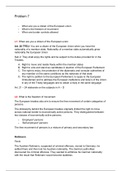Samenvatting
Summary Probleem 7
- Vak
- Instelling
- Boek
AANRADER: KOOP DE BUNDEL! Dit is een samenvatting van het blok ''Introduction to International and European law'. De samenvatting bevat probleem 7 voor het blok voor de voltijdstudenten op de precieze volgorde van hoe deze wordt besproken in de onderwijsgroepen. Het probleem is hiernaast een erg go...
[Meer zien]





